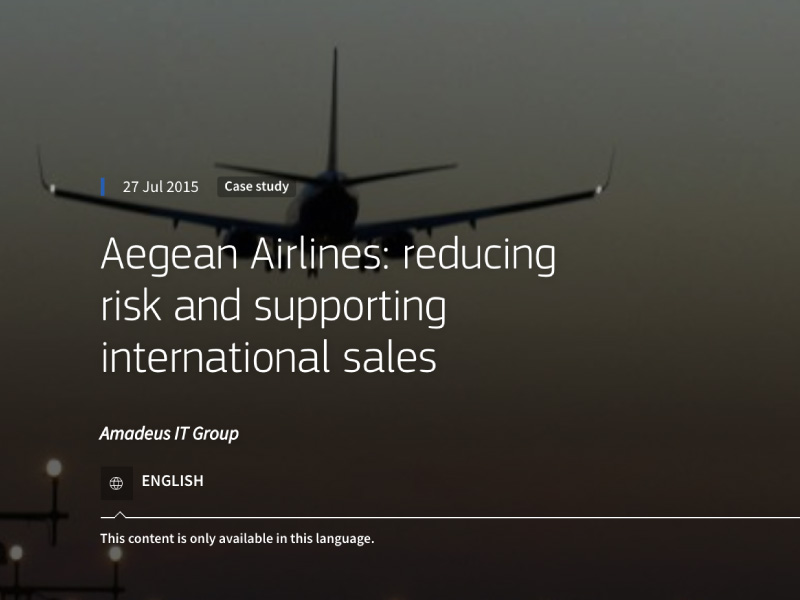The impact of travel fraud is significant
Fraud in the airline industry is perhaps more complex and far-reaching than most. With multiple traveler touchpoints, high costs, cross-border payments and card-not-present transactions, fraud is far-reaching and difficult to combat. Yet the solution is not as simple as “more security”. A balance must be met to ensure the rejection of false positives and card abandonment as a result of highly-sensitive fraud systems does not impact the bottom line.
Adding to the challenge, sales coming through indirect channels like Travel Agencies can also complicate the fraud process, as authentication details must be passed through intermediaries before collecting the payment, meaning systems must be properly adapted to receive these external fraud check results.
- Payment fraud costs 1.2% of annual ecommerce revenue1
- Airline fraud increased by 61% between 2018-20192
- Airlines account for 46% of fraudulent transactions3
1Cybersource Benchmark Study: 2018 Global Airline Online Fraud Management
2Forter – Fraud attack index 7th edition 2019
3Juniper Report – “Online Payment Fraud Whitepaper 2016-2020”
Can Strong Customer Authentication be the answer to fraud?
With the introduction of new payment regulations such as PSD2, Strong Customer Authentication has become mandatory. Like it or not, SCA brings the subject of fraud to the forefront of payment discussions across the industry.
![]()
Fraud is a global challenge
PSD2 and similar regulations are normally only enforced locally (e.g. by country or region). If merchants want to avoid implementing SCA in countries where it’s not regulated, they need to understand the true impact of fraud. However, fraud is a global risk; without analyzing and understanding every transaction, it will be extremely difficult to identify and protect against peculiar cases.
![]()
Managing exemptions
Protocols like 3DS 2.2 allow merchants to apply for exemptions. In many of these scenarios, acquirers are liable, and are likely to transfer this liability to merchants. To have a correct strategy towards exemptions and SCA optimization, merchants need to monitor their transactions and convince acquirers that their fraud levels will not be impacted.
![]()
The future of fraud prevention
More and more, fraud is moving from being a post-authorization problem to a pre-authentication activity; merchants should prioritize the implementation of optimization platforms that allow them to scan transactions prior to authorization, but also at the authentication stage, so that the user is only asked to interact when really needed.
The Amadeus Approach
As the payment flow becomes even more sophisticated, merchants will require strong and intelligent fraud techniques to boost conversion rates as much as possible.
Amadeus Payments’ enhanced fraud management offering combines our award-winning travel technology ecosystem with enhanced travel data that improves risk scoring. Our solutions are designed specifically to tackle the unique fraud challenges of the travel industry to ensure customers can minimize false positives, reduce costs, and increase sales.
Amadeus Fraud Management
An omni-channel card payment fraud management solution for airlines that is seamlessly integrated into your booking and ticketing flow.
“Cross industry” – Leading fraud management solutions
- Advanced screening techniques
- Airline direct channel
- Screening at booking
![]()
The Amadeus difference
- Travel data for better screening performance (inc. customized region specific data)
- All channels: TA and Direct
- Screening at reservation modification, pre-boarding
How we can help you improve payment outcomes
By automating rule management and transaction analysis, Amadeus was able to help one airline save €3 million, by ensuring that an average of 97% of confirmed fraud was denied by the rules.
Manual review rates also reduced from 12% to less than 5%, saving on operational costs, while chargeback rates were lowered to less than 0.1% on average.
Amadeus’ fraud platform helps to increase sales with:
![]()
Omnichannel fraud detection services to increase your online conversion rates
![]()
Fraud screening criteria and rules based on the market you are operating in, and the sub-industry you are targeting
![]()
Ability to offer local payment methods that have fraud checks in place
![]()
Improve screening precision with rich travel data





